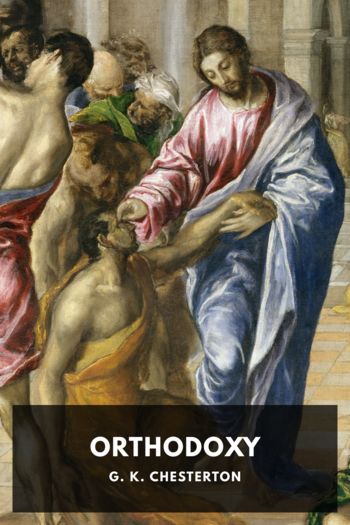Heretics, G. K. Chesterton [book series for 12 year olds txt] 📗

- Author: G. K. Chesterton
Book online «Heretics, G. K. Chesterton [book series for 12 year olds txt] 📗». Author G. K. Chesterton
People who say that an ideal is a dangerous thing, that it deludes and intoxicates, are perfectly right. But the ideal which intoxicates most is the least idealistic kind of ideal. The ideal which intoxicates least is the very ideal ideal; that sobers us suddenly, as all heights and precipices and great distances do. Granted that it is a great evil to mistake a cloud for a cape; still, the cloud, which can be most easily mistaken for a cape, is the cloud that is nearest the earth. Similarly, we may grant that it may be dangerous to mistake an ideal for something practical. But we shall still point out that, in this respect, the most dangerous ideal of all is the ideal which looks a little practical. It is difficult to attain a high ideal; consequently, it is almost impossible to persuade ourselves that we have attained it. But it is easy to attain a low ideal; consequently, it is easier still to persuade ourselves that we have attained it when we have done nothing of the kind. To take a random example. It might be called a high ambition to wish to be an archangel; the man who entertained such an ideal would very possibly exhibit asceticism, or even frenzy, but not, I think, delusion. He would not think he was an archangel, and go about flapping his hands under the impression that they were wings. But suppose that a sane man had a low ideal; suppose he wished to be a gentleman. Anyone who knows the world knows that in nine weeks he would have persuaded himself that he was a gentleman; and this being manifestly not the case, the result will be very real and practical dislocations and calamities in social life. It is not the wild ideals which wreck the practical world; it is the tame ideals.
The matter may, perhaps, be illustrated by a parallel from our modern politics. When men tell us that the old Liberal politicians of the type of Gladstone cared only for ideals, of course, they are talking nonsense—they cared for a great many other things, including votes. And when men tell us that modern politicians of the type of Mr. Chamberlain or, in another way, Lord Rosebery, care only for votes or for material interest, then again they are talking nonsense—these men care for ideals like all other men. But the real distinction which may be drawn is this, that to the older politician the ideal was an ideal, and nothing else. To the new politician his dream is not only a good dream, it is a reality. The old politician would have said, “It would be a good thing if there were a Republican Federation dominating the world.” But the modern politician does not say, “It would be a good thing if there were a British Imperialism dominating the world.” He says, “It is a good thing that there is a British Imperialism dominating the world;” whereas clearly there is nothing of the kind. The old Liberal would say “There ought to be a good Irish government in Ireland.” But the ordinary modern Unionist does not say, “There ought to be a good English government in Ireland.” He says, “There is a good English government in Ireland;” which is absurd. In short, the modern politicians seem to think that a man becomes practical merely by making assertions entirely about practical things. Apparently, a delusion does not matter as long as it is a materialistic delusion. Instinctively most of us feel that, as a practical matter, even the contrary is true. I certainly would much rather share my apartments with a gentleman who thought he was God than with a gentleman who thought he was a grasshopper. To be continually haunted by practical images and practical problems, to be constantly thinking of things as actual, as urgent, as in process of completion—these things do not prove a man to be practical; these things, indeed, are among the most ordinary signs of a lunatic. That our modern statesmen are materialistic is nothing against their being also morbid. Seeing angels in a vision may make a man a supernaturalist to excess. But merely seeing snakes in delirium tremens does not make him a naturalist.
And when we come actually to examine the main stock notions of our modern practical politicians, we find that those main stock notions are mainly delusions. A great many instances might be given of the fact. We might take, for example, the case of that strange class of notions which underlie the word “union,” and all the eulogies heaped upon it. Of course, union is no more a good thing in itself than separation is a good thing in itself. To have a party in favour of union and a party in favour of separation is as absurd as to have a party in favour of going upstairs and a party in favour of going downstairs. The question is not whether we go up or down stairs, but where we are going to, and what we are going for? Union is strength; union is also weakness. It is a good thing to harness two horses to a cart; but it is not a good thing to try and turn two hansom cabs into one four-wheeler. Turning ten nations into one empire may happen to be as feasible as turning ten shillings into one half-sovereign. Also it may happen to be as preposterous as turning ten terriers into one mastiff. The question in all cases is not a question of union or absence of union, but of identity or absence of identity. Owing to certain historical and moral causes, two nations may





Comments (0)